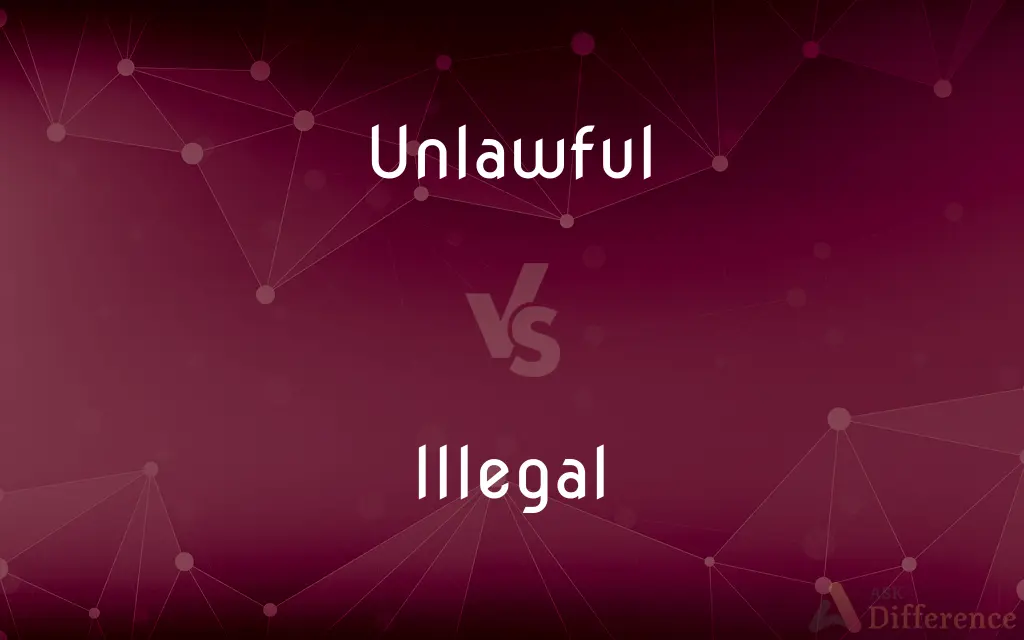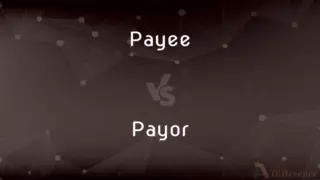Unlawful vs. Illegal — What's the Difference?
By Tayyaba Rehman — Updated on October 25, 2023
Unlawful pertains to actions contrary to law or without legal justification; Illegal denotes a breach of statute or formally codified law.

Difference Between Unlawful and Illegal
Table of Contents
ADVERTISEMENT
Key Differences
Unlawful and Illegal are often used interchangeably in colloquial speech, but they carry distinct legal nuances. Unlawful typically describes actions that are not authorized by law, meaning they don't conform to legal standards or principles. Conversely, Illegal specifically addresses actions that breach formal statutes or codified laws.
The term Unlawful can be broader and may encompass activities that aren't strictly criminal but are still prohibited by some legal standard. For instance, an action might be deemed unlawful if it goes against a contract, even if there's no criminal statute against it. Meanwhile, Illegal refers directly to violations of specific laws or statutes, making it a more precise term in legal contexts.
In common parlance, both terms signify something prohibited by law. However, in the legal realm, distinctions between Unlawful and Illegal can have significant implications, particularly concerning the nature and gravity of the offense. For example, unlawful detentions might not necessarily break a specific law but are not legally justified. In contrast, illegal drugs directly violate specific laws governing controlled substances.
Lastly, it's essential to recognize that while all illegal acts are unlawful, not all unlawful acts are necessarily illegal. This is because "unlawful" might encompass a wider range of non-compliance with legal norms, while "illegal" is more narrowly tied to specific breaches of the law.
Comparison Chart
Definition
Contrary to law or without legal justification
A breach of statute or formally codified law
ADVERTISEMENT
Scope
Broader, can include non-criminal actions
Narrower, specific to breaches of codified laws
Usage
Common in contracts and civil matters
Often used in the context of criminal law
Connotation
General non-compliance with legal norms
Direct violation of a specific law
Example
"The company's actions were unlawful."
"Selling those substances is illegal."
Compare with Definitions
Unlawful
Lacking legal justification or authority.
The detention was found to be unlawful.
Illegal
Unlawful; prohibited by statutes.
Illegal hunting is punishable by law.
Unlawful
Contrary to or forbidden by established rules.
The player's move was deemed unlawful.
Illegal
Not authorized or sanctioned by the established rules.
His move in the game was declared illegal.
Unlawful
Not permitted by law.
Unlawful entry into a property is a crime.
Illegal
Contrary to accepted morality or convention.
Their illegal practices were condemned by all.
Unlawful
Not morally right or permissible.
Their unlawful behavior caused distress to many.
Illegal
Prohibited by law.
Unlawful
Not legally warranted.
Unlawful use of force can lead to penalties.
Illegal
Prohibited by official rules
An illegal pass in football.
Unlawful
Not lawful; illegal.
Illegal
Unacceptable to or not performable by a computer
An illegal operation.
Unlawful
Contrary to accepted morality or convention; illicit.
Illegal
A person who is not legally authorized to live and work in a country.
Unlawful
(legal) Prohibited; not permitted by law (either civil or criminal law; see illegal).
He was charged with unlawful use of a car.
Illegal
Contrary to or forbidden by law, especially criminal law.
This is illegal, you know!
Nearly 40 million people live in UK areas with illegal air pollution
Their illegal mining operations in Asia, Africa and elsewhere, are protected by officials and police paid to look the other way – and powerful customers in the construction industry who prefer not to ask too many questions.
Unlawful
Not lawful; contrary to law.
Illegal
Breaching certain enacted statutes of positive law; not lawful, not legal (cf. immoral, unethical)
Unlawful
Not conforming to legality, moral law, or social convention;
An unconventional marriage
Improper banking practices
Illegal
Forbidden by established rules.
Moving a pawn backward is an illegal move in chess.
Unlawful
Contrary to or prohibited by or defiant of law;
Unlawful measures
Unlawful money
Unlawful hunters
Illegal
Totally fictitious, and often issued on behalf of a non-existent territory or country.
Unlawful
Not morally right or permissible;
Unlawful love
Illegal
Being or doing something illegally.
Illegal immigrant
Illegal logger
Illegal pilot
Unlawful
Having no legally established claim;
The wrongful heir to the throne
Illegal
Being an illegal immigrant; residing in a country illegally.
Unlawful
Contrary to or forbidden by law;
An illegitimate seizure of power
Illicit trade
An outlaw strike
Unlawful measures
Illegal
(obsolete) An illegal act or technique.
Illegal
Contraband, esp. illegal substances such as drugs.
Illegal
An illegal immigrant.
Illegal
(espionage) A spy working abroad illegally and undercover, without visible ties to his or her country’s authorities.
Illegal
Not according to, or authorized by, law; specif., contrary to, or in violation of, human law; unlawful; illicit; hence, immoral; as, an illegal act; illegal trade; illegal love.
Illegal
Prohibited by law or by official or accepted rules;
An illegal chess move
Illegal
Forbidden by law; criminal.
Illegal drug trafficking is a major concern.
Illegal
Not allowed by official rules or regulations.
Illegal parking will get you a ticket.
Common Curiosities
Can something be Unlawful but not Illegal?
Yes, all illegal acts are unlawful, but not all unlawful acts are necessarily illegal.
Is Illegal more specific than Unlawful?
Yes, Illegal refers directly to violations of specific laws, while Unlawful can be broader.
Does Illegal always pertain to criminal acts?
Primarily, but it can also refer to breaches of non-criminal statutes.
Which term is broader in scope?
Unlawful is broader, encompassing any act not authorized by law.
How might the distinction impact legal proceedings?
The terms could influence the nature and severity of penalties or remedies sought in legal cases.
Are all Illegal actions also Unlawful?
Yes, all illegal actions are considered unlawful.
Do both terms have roots in legal language?
Yes, both derive from legal contexts, though they've found their way into everyday language.
Are Unlawful and Illegal synonyms?
They are often used interchangeably, but they have distinct legal nuances.
How do contracts typically use the term Unlawful?
Contracts might declare certain actions or breaches as "unlawful" even if they aren't criminal.
If someone does something against company policy, is it Unlawful or Illegal?
It might be considered "unlawful" within the company's framework, but not necessarily "illegal" unless a law is broken.
Why might it be crucial to differentiate the two in legal contexts?
The distinction can determine the nature of the offense, potential penalties, and the applicable legal remedies.
Can an act be morally Unlawful but legally permitted?
Yes, something might be seen as morally or ethically "unlawful" yet not be "illegal" under current laws.
Can both terms relate to moral standards?
Both can, but Unlawful is more often linked to broader moral or ethical considerations.
Can societal norms influence what's considered Unlawful or Illegal?
Societal norms often shape laws, so what's seen as Unlawful or Illegal can evolve with societal values.
Is it common for non-legal professionals to use the terms interchangeably?
Yes, in everyday speech, the nuances between Unlawful and Illegal are often overlooked.
Share Your Discovery

Previous Comparison
Payee vs. Payor
Next Comparison
Polypeptide vs. ProteinAuthor Spotlight
Written by
Tayyaba RehmanTayyaba Rehman is a distinguished writer, currently serving as a primary contributor to askdifference.com. As a researcher in semantics and etymology, Tayyaba's passion for the complexity of languages and their distinctions has found a perfect home on the platform. Tayyaba delves into the intricacies of language, distinguishing between commonly confused words and phrases, thereby providing clarity for readers worldwide.
















































